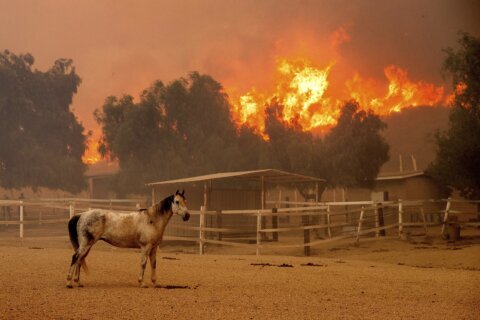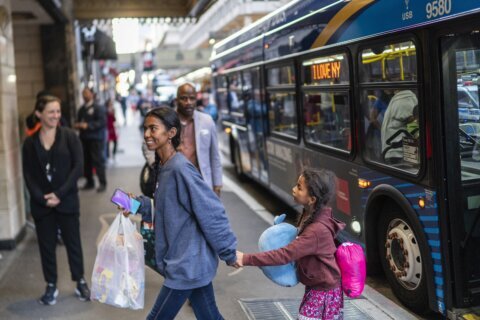WASHINGTON (AP) — It was almost time for the presidential debate, but Kamala Harris’ staff thought there was one more thing she needed to know. So less than an hour before the vice president left her Philadelphia hotel, two communications aides got her on the phone for one of the strangest briefings of her political career.
They told her that Donald Trump had been posting on social media about a false and racist rumor that Haitian migrants in Springfield, Ohio, were eating people’s pets. The former president might mention it during the debate, they said.
The warning, described by two people with knowledge of the conversation, proved spot on.
While answering a question about immigration policy, Trump said migrants in Springfield were “eating the dogs” and “they’re eating the cats.” Harris laughed, shook her head and stared at her Republican opponent in amazement. “Talk about extreme,” she said, and then moved on.
It was easily the most bizarre moment from last week’s debate, spawning an explosion of online memes and parody videos. Now, Harris is trying to use her performance as an ongoing source of momentum, hoping to rekindle the kind of energy that she generated when she replaced President Joe Biden at the top of the Democratic ticket.
It is unclear whether the debate will affect the outcome of the Nov. 5 election. In a flash poll of viewers conducted by CNN afterward, opinions of Trump were unchanged and Harris received only a slight bump in the share of people who view her favorably. But her team is making the most of it, turning key points into television advertisements and flooding the internet with clips. No equivalent effort is apparent from Trump’s side, despite his repeated insistence that he came out on top.
There almost certainly will not be another debate; Trump has said he will not do one. That means the debate at the National Constitution Center in Philadelphia may be the only chance that voters will have to see the candidates side by side.
This story is based on interviews with five people close to Harris, who spoke on condition of anonymity to describe private conversations and reveal new details about how she prepared for and handled the debate. It was her first time meeting Trump in person.
Harris spent five days getting ready at a hotel in downtown Pittsburgh after a breakneck few weeks of campaigning.
Her team recreated the set where she would debate Trump on the night of Sept. 10. It was a far more professional setup than Harris had used eight years earlier as she was running for Senate in California, when campaign staff taped together cardboard boxes to serve as makeshift lecterns.
Two communications aides — one man, one woman — stood in for David Muir and Linsey Davis, the ABC News debate moderators.
Philippe Reines, a longtime aide to Hillary Clinton, reprised his role as Trump, which he played when the former secretary of state ran for president. Reines wore a dark suit, a long red tie and orange bronzer to embody Trump.
One challenge would be the microphones.
When Biden was running, his team agreed that the debate microphones should be muted when it was not a candidate’s turn to speak. But Harris’ staff wanted the microphones hot at all times, which would allow her to jump in and create more opportunities for Trump to make outbursts.
But their campaign could not reach an agreement to change the rules, and the original plan remained in place.
Harris decided to make the most of the split screen format, where each candidate would be on camera at all times. Biden had flubbed the visual test when he debated Trump in June, often looking aimless with his mouth slightly agape. Harris provided silent commentary through her expressiveness — laughing, raising her eyebrows, bringing her hand to her chin with a quizzical look.
At one point during preparations, staff members suggested practicing mannerisms that Harris could use. The vice president waved them off, saying she would be fine without that kind of rehearsal.
Harris rarely left the hotel during preparations. On Sept. 7, she took a field trip to Penzeys Spices, where she picked up some seasoning mixes. One woman in the store wept as Harris hugged her. On Sept. 8, Harris and her husband, Doug Emhoff, went to a military airbase and took a walk for about a half hour. Because of security considerations, the tarmac was the only place where they could stretch their legs.
Asked if she was ready for the debate, Harris gave reporters a thumb’s up and said “ready.”
She ended up leaving Pittsburgh on Sept. 9 rather than the day of the debate, canceling an extra mock debate and getting to Philadelphia earlier than expected.
As the clock ticked down to the start of the debate, dozens of staff members in the campaign’s Delaware headquarters assembled in assigned seats in front of four television screens. Some were nervous, still rattled from watching Biden implode in his own debate with Trump.
But Harris’ opening move, striding toward Trump to shake his hand as they took the stage, helped ease those jitters.
Throughout the debate, Harris mocked and needled Trump, throwing him off balance with jabs about the size of crowds at his campaign rallies. She pounced on questions about abortion and promised the country a new generation of leadership, while Trump became increasingly agitated and missed opportunities to press his case against her.
During the final commercial break, Trump departed the stage with a sigh. Harris stayed at her lectern, writing on her notepad, reviewing her words and taking a sip of water.
In her closing statement, she told viewers that “I think you’ve heard tonight two very different visions for our country — one that is focused on the future and the other that is focused on the past.”
Trump ended his remarks by calling Harris “the worst vice president in the history of our country.”
There was no live audience in the room to react to the candidates, and it was not always clear whether certain lines or expressions were hitting their marks.
So when Harris left the stage, she had a question for her staff: How did I do?
Copyright © 2024 The Associated Press. All rights reserved. This material may not be published, broadcast, written or redistributed.







